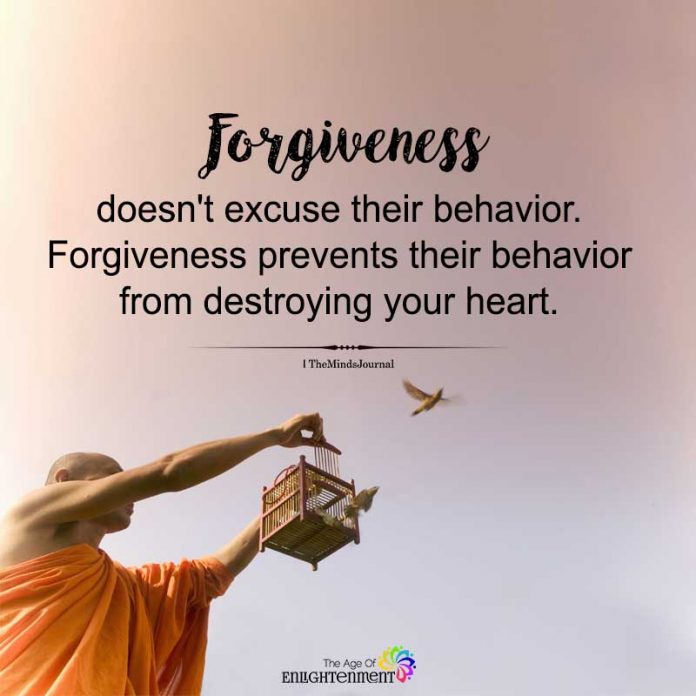Blaming your parents is easy as pie but forgiving them is hard as hell! Why you should forgive your parents and how to do it?
On the surface, forgiving your parents (or anyone for that matter) may seem insignificant but forgiving your mother or father is actually the best thing you can do for the quality of your life. Even low-grade parental blame and resentment perpetuate a cycle of emotional pain and suffering that can negatively affect your adult relationships, finances, and overall wellbeing, ultimately preventing the love, abundance, and happiness you desire and deserve.
If you have no comparison, you might not notice the amount of energy it takes to hold onto an emotional wound or even a small grudge, but holding onto anger, resentment or any form of hostility requires a tremendous amount of life force energy and this energy is non-refundable. Decades of anger and resentment can cut years off your life, and you wouldn’t even know it. Think of it like throwing hundred dollar bills into the toilet each day, except life force energy is infinitely more valuable than all the money in the world.
The Cycle of Suffering
Without healing our childhood wounds and subsequently forgiving our parents, we stay emotionally stuck at the age of our earliest wounds, and because this causes us to repeat the cycle of suffering, we keep experiencing an adult version of our childhood wounds. For instance, let’s say you haven’t forgiven your mom for missing your tenth birthday or healed the resulting feelings of abandonment; whenever this issue is triggered by a current-day experience (ex: someone forgets to call you), the original emotional wound is activated and you drop into an unconscious reaction. For all intents and purposes, you become your wounded ten-year-old self, and because you feel the same pain you felt then, you react by lashing out or shutting down.
Because an emotional reaction is an automatic response to an unhealed wound, there is little or no control over emotions or behavior, and this dynamic can result in a series of current-day relationship issues. Year after year, the cumulative effect of emotional reactions can destroy the quality of our most important relationships.
Related: 13 Signs You’re Suffering From Toxic Family Enmeshment
Law of Attraction
According to the Law of Attraction, we unconsciously attract people who trigger our emotional wounds, and this is why a person with abandonment issues attracts potential partners who have commitment fears; not as punishment or karma but rather because our higher selves want us to heal and will use every opportunity to bring our wounds to the forefront. Unfortunately, this means that unhealed emotional wounds can prevent you from meeting your ideal partner or soul mate, and even if you do find each other, the turbulent nature of emotional wounds is known to sabotage even the most ideal partnership.
Related: Law of Attraction 101: The Secret To Manifesting Your Dreams
Blame Perpetuates Pain
Blaming your parents not only keeps the wound alive, but it also tells your subconscious mind that your parents currently have power over you or your life, and, therefore, blame programs you for disempowerment. Like a virus, this dynamic can spread to every facet of your life. Additionally, whenever we blame another, we become entangled with their energy and stay entangled until we let go, and, consequently, we cannot grow beyond the parent we blame. So, it’s important to forgive your parents.
Related: Ways We Rationalize Abuse and Blame Ourselves Instead
Of course, it’s no big surprise that forgivingness is the key to emotional freedom, but, in most cases, forgiveness is easier said than done. But why?

Why is forgiveness so difficult?
First, you must realize that blame, anger, and various related emotions are defensive guards that protect you from future harm. Since true forgiveness requires you to release this defense, the very act of forgiveness creates emotional risk. Therefore, to forgive your parents, you must trust they won’t hurt you again, but, the hard truth is, you can never be certain – there is no way to control or predict another person’s behavior, and sometimes loving people do hurtful things.
If you are still vulnerable to being hurt, forgiveness could destroy the only defense you have, and, if this is the case, your protective ego will not allow you to forgive. Therefore, before you can forgive, you must eliminate the risk of emotional harm, and this inevitably means self-responsibility.
Related: Is Forgiveness Truly Possible In Relationships When Someone Has Hurt You Deeply
Responsibility before Forgiveness
There’s no way around it, as long as you blame or shift responsibility in any regard, you give others the power to hurt you, and as long as you give others the power to hurt you, you’re going to be hurt. Therefore, the only way to prevent emotional harm is by releasing blame and taking full responsibility for every emotion you experience, but there is no point assuming responsibility if you don’t also uncover the dynamics behind your childhood issues. Therefore, to make yourself immune to emotional harm, you must pinpoint the hidden cause of your childhood wounds, and once you do, I will show you how to heal it now.
Related: The Truth About Victimhood That Can Heal and Set You Free

Understanding the True Nature of Emotional Wounds
We often confuse an emotional wound with the event or experience that caused the wound, but the actual wound is not the situation or circumstance. An emotional wound is a disempowering belief we adopted in response to the experience. Without needing to analyze the details, the core emotional wound is virtually always unworthiness, and, in fact, unworthiness (or conditional worthiness) is the core wound of every other emotional wound.
Related: Why Do We Struggle to Heal Emotional Wounds?
All children have emotional needs that must be met to feel worthy of love and life; these needs include approval, acceptance, appreciation, understanding, validation, respect, etcetera. Although children require all emotional needs to be fulfilled, one emotional need almost always stands out from the rest, and because this is usually the need least met, it is the emotional need most associated with worth, and, as a result, it becomes the child’s Primary Emotional Need (PEN).
Children naturally adopt beliefs that explain why one or both parents fail to provide this emotional need, so when a child doesn’t receive approval, for example, the child naturally believes she is unworthy of approval, or more likely, she believes she must meet certain conditions to prove she is worthy. Hypersensitive to this need being met, she automatically interprets approval as proof of worthiness and judgment as proof of unworthiness, and this is why judgment can cause intense emotional pain even in adulthood.
Here’s the thing, like every human being, you were born unconditionally worthy, and there is absolutely nothing you can do to prove, improve, or disprove worth. Therefore the emotional pain associated with believing you are unworthy is due to the fact it is completely untrue! Emotional pain is a warning system that alerts you to false beliefs.
Why do we need to be warned of false beliefs?
All disempowering beliefs, such as unworthiness, powerlessness, and victimhood, put us into survival mode, and over time can cause chronic and acute issues with serious repercussions, and, therefore, we need a warning system that alerts us to debilitating beliefs. This warning system is emotion, and, in fact, the purpose of emotional pain is to alert you to the fact you believe a falsehood.
Related: 11 Limiting Beliefs That Are Holding You Back In Life
Just like physical pain alerts you the second you prick your finger with a knife, so you won’t cut your whole finger off, emotional pain alerts you to harmful beliefs so you can release them.
Without knowing that emotional pain is a sign of a false belief, most of us wrongly interpret this pain; so whenever we feel the emotional pain associated with unworthiness, the pain makes us believe the belief is true, thereby strengthening the belief and deepening the wound, and this perpetuates a cycle of emotional pain.
Furthermore, this internal warning system will stop at nothing to make you aware of a false belief, and, in fact, with increasing amplification, you will attract continuous opportunities that trigger emotional pain until you finally pay attention and release the false belief that is responsible for the pain. All emotional healing is releasing disempowering beliefs.
Entangled in the conscious or unconscious belief that worth depends on getting our parents to meet our emotional needs, we grow into adults, still expecting one or both parents to give us what we need to feel worthy. But, this just sets us up for more pain because it never works.
Related: What You See First In This Image Reveals How Emotionally Intelligent You Are
Why don’t parents meet their children’s emotional needs?
First of all, even the most well-intentioned parents often fail to meet their children’s emotional needs, and, in most cases, emotional wounds have nothing to do with parental love. Oftentimes, childhood emotional wounds are by-products of parenting style or our parent’s unhealed wounds or family issues, such as financial challenges, divorce, or a family member’s addiction, disease, mental illness, or chronic depression.
Related: 10 Do’s and Don’ts To Keep Your Parenting Healthy and Non Toxic
Although parental judgment, criticism, and comparison to siblings or other children are the most common causes of the worthiness wound, almost any dynamic can set the stage, for instance, when a parent is over-protective or over-controlling, a child may feel disrespected and develop the belief he is unworthy of respect, and he may conclude he is untrustworthy, or when a child is told to be seen but not heard, she may develop the belief she is not worthy to speak, or she may believe she is not important.
In most cases, a child’s emotional wounds deepen over time, and as the child matures into adulthood, the wound matures accordingly; manifesting as problematic relationships, financial concerns, career challenges, and health issues, while also making it difficult to pursue one’s dreams and desires.
Related: 6 Lies Narcissistic Parents Make Their Children Believe
Many adult children protect themselves from parental judgment and manipulation by closing their hearts and putting up energetic barriers, but despite the defensive quality of anger and blame, it doesn’t protect us from emotional pain because the shield actually keeps the pain inside while it also prevents healing. Regardless of age, every time your parents fail to meet your Primary Emotional Need, feelings of disappointment feed unworthiness and often lead to powerlessness.
Related: 6 Ways Parents Can Communicate Better With Their Teens (According To Teens)
The Unworthiness Wound Causes Powerlessness
Do you still need parental approval, acceptance, validation, or permission to feel worthy? If so, do you conceal behaviors that don’t meet your parent’s expectations?
This dynamic is quite common in most adults but there is a huge cost involved because whenever you suppress authentic expression in exchange for approval or acceptance, for example, you inadvertently give away your power. In fact, it is impossible to expect your parents to meet your emotional needs and make you feel worthy without giving them your power.
Related: How Childhood Trauma Is Screwing Up Your Relationships
Consequently, the relationship is based on dysfunctional dynamics where you remain a powerless child who is vulnerable to being hurt. Not only does this make you susceptible to parental judgment and criticism, it also makes you vulnerable to manipulation through guilt and obligation.
Although the blame is a natural response to powerlessness, it actually tells your subconscious mind that the parent you are blaming has power over you, and, therefore, blame perpetuates more powerlessness. Indeed, you won’t be able to heal your emotional wounds or forgive your parents as long as you blame them for making you feel powerless and unworthy. This is why self-responsibility is the cure, and, in fact, self-responsibility is the only thing that can solve your issues.
Related: The Lifelong Effects of Childhood Neglect By Parents
Self-responsibility means that you must own your unconditional worth and you must take back your power by releasing the expectation that your parents meet any of your emotional needs, and this also includes releasing the need for apology, acknowledge, or retribution.
Give to yourself what you need from your parents!
As you take responsibility for your life and your choices, you must stop seeking parental permission and emotional support, and, in fact, you don’t even need your parents to believe in you or your dreams. The same reasons your parents didn’t meet your needs in childhood are the same reasons they still don’t. So you can let them off the hook and release all expectations!
Finally, when you know your unconditional worth, and you own your intrinsic power, your parents can’t hurt you emotionally, and, consequently, forgiveness becomes possible.
As dysfunctional dynamics dissolve, it gives way to a new paradigm of relationship based on unconditional worth and self-empowerment. The foundation of this deeper connection is clear boundaries, and, in fact, boundaries can take you from a powerless child to an empowered adult in a heartbeat. Indeed, your personal power is only as strong as your boundaries.
Boundaries are Key!

As an adult-child, it is up to you to set boundaries with your parents. Initially, it might feel uncomfortable, but, over time, strong boundaries will strengthen the relationship and allow for a deeper connection. So, to create a positive adult relationship with your parents, what boundaries do you need as an empowered adult?
Keep in mind, a boundary of respect, for example, is vague and you probably need to define the parameters of respect, so clearly and specifically spell it out in terms of communication and interaction. In all likelihood, you will need to teach your parents how to treat you, speak to you, and behave in ways that reflect respect. It’s also a good idea to invite your mom and dad to establish their boundaries and do your very best to honor them, as well.
Related: Setting Boundaries That are Clear and Well-Expressed
Boundaries are set through intention but established with attention!
Effective boundaries require integrity, and this means that you must back-up every boundary with proper and consistent attention. Therefore, don’t expect your parents to automatically know when they are encroaching on a boundary. When people are used to behaving in habitual ways, it takes time to recognize new boundaries and reorganize new behavior accordingly. This means that it’s your responsibility to protect your boundaries, and, therefore, confidentially give clear feedback; tell your mom or dad when they are crossing (or about to cross) a boundary
However, if either parent doesn’t respect your boundaries, don’t be afraid to limit interactions accordingly, but let them know why, so they have the necessary information to change their behavior. Believe it or not, most parents will eventually learn to respect boundaries, but only if you consistently enforce them first.
Related: 9 Essential Core Boundaries To Set In Relationships, Work and Life
Reaping the Rewards
No matter how it seems, childhood wounds always leverage hidden gifts, such as independence, wisdom, or compassion, and without emotional challenges, our best attributes might never be revealed. If you haven’t yet recognized the positive qualities that sprung from your childhood wounds, now would be a wonderful time to do so because the recognition itself can be extremely healing. Indeed, the point is to heal the wounds but keep the benefits!
Finally, always remember that forgiveness is never for the person being forgiven. Forgiveness is the gift you give yourself.
You are love, you are light, and all is well!
So, are you ready to forgive your parents? Share your thoughts in comment below.
Written by: Nanice Ellis
Originally appeared on: Nanice










Leave a Reply